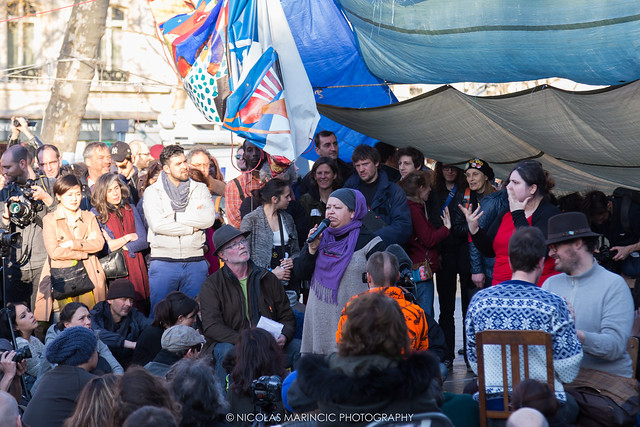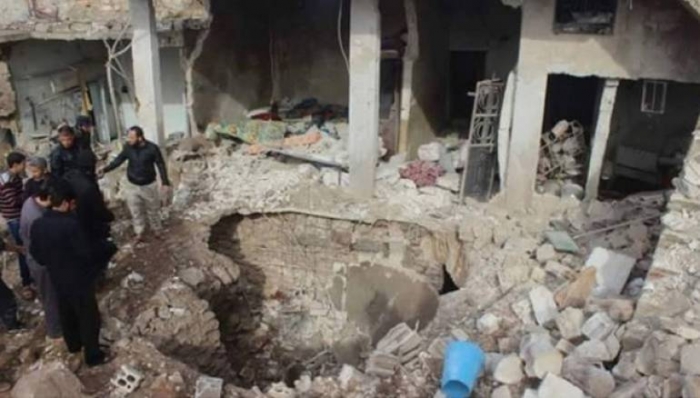From the May-June 2016 issue of News & Letters
Draft for Marxist-Humanist Perspectives, 2016-2017
The need for new beginnings in thought and in action
Contents:
Introduction
I. Discontent, revolt and reaction in the U.S.
II. The worldwide war against women
III. Chinese labor in revolt
IV. Counter-revolution and revolution in the Middle East and North Africa
V. Toward organizational new beginnings
…Continued from III. Chinese labor in revolt
IV. Counter-revolution and revolution in the Middle East and North Africa
Another beacon shines from Syria: the massive, countrywide renewal of civilian demonstrations for freedom, using the original chants and slogans of the 2011 Revolution: “The people want the downfall of the regime!” “Revolution for Dignity and Freedom!” As revolutionaries in Kafranbel put it: “A ceasefire is a ceasefire; our peaceful revolution continues until toppling Assad and bringing justice to all Syria.”
Exploding into the space opened by a very partial “cessation of hostilities,” the revolt was unforeseen by any party to the military struggle—whether the genocidal Bashar al-Assad, Vladimir Putin and Iranian Supreme Leader Ali Khamenei, or the hypocritical Barack Obama administration with its efforts to “vet” and channel the meager international aid that comes to the Syrian revolutionaries, or the vicious Islamic State (ISIS) with its dreams of apocalypse. All state powers were in agreement on one point: that the idea of a revolution can be destroyed by bombs, and if the Free Syrian Army were eliminated, finally, a “solution” could be imposed.

Dr. Hasan al-Araj. “The last cardiologist in Hama was killed by airstrikes today. Dr. Hasan al-Araj ran the Syrian American Medical Society Cave Hospital. Does anyone who isn’t Syrian even understand how phrases like ‘the last cardiologist’ or ‘cave hospital’ are normal in 2016?” —Lina Sergie Attar
They overlooked the way democratically elected local councils continued to organize social life under regime and ISIS attacks. Perhaps most telling have been the month-long demonstrations in Maarat al-Numan in Idlib, speaking out against both the Assad regime and the authoritarianism of Jabhat al-Nusra, the Al Qaeda affiliate that has (like the U.S.) been a treacherous “ally” of the Revolution.
As local tensions grew and Jabhat al-Nusra took a number of Free Syrian Army members prisoner, hundreds of Maaratis stormed Nusra’s headquarters on March 13, freeing some prisoners and burning the building. Mass protests, in which women have been prominent, have continued. As we go to press, regime-allied warplanes have bombed the market full of families, killing scores. Similar protests have been seen in Darkoush, al-Atareb, and other villages.
Maaratis sent messages of solidarity to the independent protests that have taken place in Suweida among the Druze and have also taken up the Revolution’s original slogans, including “One! One! One! The Syrian people are One!” Russia’s brutal carpet bombing campaign combines with the imperialist presence of tens of thousands of Iranian troops, Lebanese Hezbollah, Iraqi militia fighters, Afghan conscripts used as cannon fodder, and European fascists. Yet Assad’s regime continues to lose what little internal support it ever had.
Even among the Alawis, Assad’s “own” group, there has been an effort to dissociate from the regime. An Alawi “Declaration of Identity Reform” attributed to senior community leaders attempts
to distance the Alawis from the regime (and Iran) and calls for democracy and ethnic equality. Perhaps more significant is the continuing exodus of the Alawis from Syria—either way, they see that the Assad regime has no future.
DISMAL FAILURE OF THE PYD
Seldom has any revolutionary organization been given the opportunity and responsibility that history handed the Democratic Union Party (PYD)—the Kurdish group that took the world’s center stage in the heroic defense of Kobane against ISIS.
That moment electrified a generation of young revolutionaries. Unfortunately, since then the PYD has indulged in alliances with imperialism (both U.S. and Russian) in order to make petty and unsustainable territorial gains that will only harm the long-term prospects for Kurdish self-determination.
The dynamic of the Syrian Revolution calls for a broad, unifying vision. The masses, as we see, do express that in their protests. Meanwhile the “revolutionary vanguard” PYD wastes the lives of hundreds of its own dedicated fighters, and of other revolutionaries, in mindless fighting over villages and neighborhoods. In North Aleppo, Free Syrians find themselves fighting the regime, ISIS, and the PYD.
Recent fighting in Qamishli between Assad regime and PYD forces shows the real prospect of Kurdish self-determination as part of the Syrian Revolution. Revolutionaries will support that, as well as the Kurdish struggle for women’s liberation and economic justice.
CRISIS OF WORLD CIVILIZATION
It is impossible to separate the crisis wracking the post-Arab Spring Middle East and North Africa region from what Syrian author Robin Yassin-Kassab termed a “civilizational crisis.”
The need to solidarize with the Syrian people’s revolution of freedom and dignity has been the test of world politics. Yet little attention has been paid to the revival of civilian protest, as if the media and politicians are more comfortable with “meaningless” destruction than human solidarity. This has been obvious in the tolerance for military dictatorship in Egypt, with its thousands of political prisoners and brutality toward any form of dissent.
The increasing militarization of the Middle East is above all an effort to destroy the possibility of new human relations opened up by the Arab Spring. Factions in Yemen that once demonstrated side by side in Change Square now find themselves “represented” by Saudi and Iranian-armed military forces that have devastated the country, killing thousands, along with a growing Al Qaeda presence feeding off the chaos.
Both Iran and Saudi Arabia have directed vicious counter-revolutionary force against the Arab Spring uprisings. For their services, both regimes have been well rewarded by the U.S. and Russia.
RAMIFICATIONS IN EUROPE
The increased flow of refugees into Europe is fed in part by this militarized repression, in which European states are complicit by inaction. After a moment of sympathy symbolized by the drowned Syrian child, Aylan Kurdi, the European debate over the refugees moved toward the counter-revolutionary ground of the racist Right. This is due in part to the effects of ISIS’s terrorist attacks in France and Belgium, and in part to the failure of Europe’s intellectuals to win a battle of ideas for humanism and multi-ethnic society that goes back to the struggle against genocide in 1990s Bosnia.
Walls have been built and military blockades raised in Greece, Serbia and Hungary. In Bulgaria refugees have been hunted down and beaten by vigilantes who become celebrated by right-wing media. The Far Right has capitalized upon the refugees’ misery to make electoral gains throughout Europe, from Greece to Denmark, Poland to France.

Nuit Debout in a banlieue, April 10, 2016. Photo by Nicolas Marincic, https://www.flickr.com/photos/daemon_nikopol/25761838394/in/photolist-Ffua2u.
Thus, so many people who have already been denied international solidarity become subject to a further refusal of human solidarity. Refugees in “civilized” France are shunted into what amount to concentration camps, as in Calais, for example. The discussion opened up around the Roma in France’s Nuit Debout youth movement cries out to be deepened and extended to refugees from Africa and the Middle East. The movement has welcomed refugees to its nightly assemblies and is trying to reach out to suburbs populated by oppressed minorities.

Atelier – Nuit Debout, Montpellier, April 9, 2016. Photo by San FR, https://www.flickr.com/photos/a_n_t_h/26365354415/.

Nuit Debout in Paris, place de la République, April 10, 2016. Photo by Olivier Ortelpa, https://www.flickr.com/photos/copivolta/25771481194/.
Triggered by the Socialist government’s “reform” bill weakening labor protections, Nuit Debout was born when over one million people demonstrated across France on March 31. With the aim of “reclaiming a public space for debate,” thousands participate in nightly general assemblies and wide-ranging debates. The movement has spread to dozens of French cities as well as to Belgium, Germany and Spain.
Following a recent surge in workplace and other social struggles, this latest manifestation of the wave of revolt announced by the Arab Spring has sought directly democratic “horizontal” forms of organization independent from political institutions, with no anointed leaders. It faces challenges to draw in the lower and deeper layers, including workers and youth of Arab and African descent, and to clarify desires for a totally new foundation of society incompletely expressed in initiatives like drawing up a new constitution. Thus Nuit Debout called for large gatherings in squares across France on May Day, the revolutionary labor day.
The Right has consciously tried to destroy the solidarity from below with which refugees have been met by a significant number of Europeans, from Germany to Greece. At the very time Greece is mired in a crippling economic depression and European fiscal aid hangs by a thread, masses of Greeks met the migrants as humans. While the Greek “radical Left” state is rounding up refugees in camps, and the neighboring Macedonian police have tear-gassed those gathering at the border, ordinary citizens have provided immigrants food and shelter. Conscript soldiers in 50 units issued a statement last October protesting the inhuman treatment of refugees and migrants as an attack on the working class and declared, “We refuse to convert the Greek army into a repressive apparatus, whether that involves confronting migrants or social movements.”[1]
With all the experience gained since 2011, it is clear that one of the most vital roles revolutionaries have to play is to raise international solidarity as key.
THE NECESSITY FOR PHILOSOPHY
The continuing Syrian demonstrations are inspiring. However, they are unlikely to gain the needed support for the Revolution that has so far been denied it, as the problem is as much one of philosophy, of ideas, as it is of perception. This is clear in the way the bourgeois (and most Left!) media have ignored them while maintaining an exaggerated focus on the military situation—precisely what has been shown as secondary to the creation of new human relations. Thus the seizure of Palmyra from ISIS by Assad’s allies is portrayed as a great victory. (Not so much for the remaining townspeople who have continued to suffer beating and humiliation under their imperialist “liberators.”)
The pragmatism of the rulers leads only to disaster and incoherence. We see a tangle in which the U.S. is allied with Iran in fighting ISIS in Iraq; rhetorically, at least, opposed to Iran as it props up Assad in Syria; and allied with Saudi Arabia as it bombs civilians and Iranian-supported Houthis in Yemen. Putin’s Russia has a similar tangle of alliances, without the veneer of “principle.”
Rather, what is needed in the face of this “civilizational crisis” is a body of revolutionary ideas that comprehends the indispensability of spontaneity in the revolution, the question of different cultures, of self-development, and of non-state forms of collectivity.[2]
…Continued in Part V. Toward organizational new beginnings
[1] “Greek conscripts: ‘we won’t take part in fighting migrants,’” Oct. 19, 2015.
[2] See Raya Dunayevskaya’s “A Post-World War II view of Marx’s Humanism, 1843-83; Marxist Humanism in the 1950s and 1980s,” in Bosnia-Herzegovina: Achilles Heel of Western ‘Civilization’ (News & Letters, 1996).

